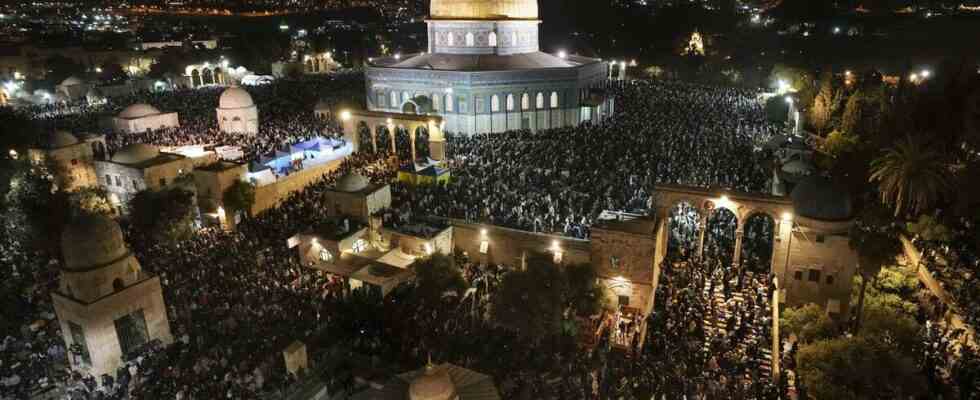The tensions are palpable on the esplanade of the Mosques of Jerusalem. This Thursday, clashes broke out between Israeli police and Palestinians. The Israeli police entered the esplanade to “repel” “dozens of rioters who threw projectiles” and one of its members was slightly injured, according to a press release.
For its part, the Palestinian Red Crescent reported two injured Palestinians who were evacuated to hospital. According to an AFP photographer on the spot, the police fired tear gas and rubber bullets after reinforcing their presence in front of the al-Aqsa mosque located on the esplanade, the third holiest site in Islam but also the site holiest in Judaism as the Temple Mount.
Forbidden to pray
After a break of several days linked to the end of the Muslim fasting month of Ramadan, Jewish worshipers gathered on the esplanade on Thursday, the day of the 74th anniversary of the creation of the State of Israel according to the Hebrew calendar, coinciding with the end of the Muslim celebrations of Eid al-Fitr.
“From 7 a.m. to 11 a.m., around 600 extremists [juifs] from 25 different organizations came to the esplanade,” the sheikh of al-Aqsa mosque, Omar al-Kiswani, told AFP. By virtue of an unspoken status quo, non-Muslims can go to the esplanade but without praying there. But the growing number of Jews went there and the fact that some of them surreptitiously pray there, raise fears of a challenge to this status quo among many Muslims.
Rocket threats
Last week, the leader of the Palestinian Islamist movement Hamas in the Gaza Strip, Yahya Sinouar, threatened Israel with rocket fire in the event of a “new attack” on the Al-Aqsa mosque. In April, Israeli security forces entered the Al-Aqsa Mosque, sparking outrage among Palestinians and countries in the Middle East.
In power in Gaza under Israeli blockade, Hamas claims to want to defend the esplanade of the Mosques. Nearly a year ago, Hamas rocket fire into Israel after clashes in East Jerusalem that injured hundreds of Palestinians sparked an 11-day war with the Israeli army.
The opening maintained
“The rise of the Jews on the Temple Mount proves that Hamas is a weak organization that can be easily subdued. On this 74th anniversary of the independence of the State of Israel, it is important that even members of the government remember that we are an independent state,” Israeli far-right leader Itamar tweeted. Ben Gvir (opposition).
In recent weeks, Naftali Bennett’s government has repeatedly said it doesn’t want to change the status quo at the compound, a hotbed of tension in Jerusalem, and held talks with neighboring Jordan, which administers the Muslim holy site. , in the hope of avoiding slippages. The Israeli government, which controls access to the site, maintained its reopening to Jews on Thursday despite calls from Palestinian and regional officials who feared further clashes.
“Judaize” the esplanade
Since mid-April, clashes between Israeli and Palestinian police have injured nearly 300 people, the vast majority of them Palestinians, on the esplanade located in the Palestinian part of Jerusalem, occupied since 1967 by Israel. The Bennett government’s decision is “an official Israeli declaration of religious war that will inflame the entire region”, the Palestinian Foreign Ministry said in a statement.
The ministry accused Israel of wanting to “Judaize” the mosque esplanade and the police of blocking the door of the al-Aqsa mosque while Muslim worshipers were gathering there. For its part, Jordan slammed the Israeli government’s decision to allow Jewish ‘extremists’ to ‘break into’ the plaza, saying their presence there must be ‘coordinated’ with the Jordanian Waqf beforehand. , the authority responsible for Muslim places of worship.

